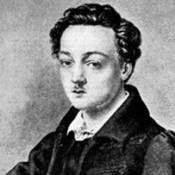
By Philipp August Joseph Hoffmann - Internetseite Stadt Gießen, Public Domain
Georg Buchner
Playwright
Biography
Georg Buchner
Karl Georg Buchner was a German playwright, scientist, and a political revolutionary. Originally, he studied medicine, but his interest in Shakespeare and literature propelled him into writing plays, poetry, and prose. Buchner's political interests led him to establish a secret society dedicated to advancing the human rights of men and women and published (with Friedrich Ludwig Weidig) a pamphlet critical of the social injustice in Hesse. Weidig was captured, tortured, and died in prison, but Buchner - charged with treason - fled to France, where he wrote most of his major works.
Woyzeck is probably Buchner's most popular play, and perhaps the most exemplary of his revolutionary ideals. The play deals with the social injustices and dehumanization of the military. Unfortunately, Buchner died of typhoid in 1837 at only 23 years old, and Woyzeck exists only in fragments. Many scholars agree, had it not been for Buchner's early death, his literary esteem would have rivaled other German writers such as Johann Goethe and Friedrich Schiller.
Shows
Shows associated with Georg Buchner
Monologues
Monologues from shows associated with Georg Buchner
Scenes
Scenes from shows associated with Georg Buchner
Quizzes
Quizzes associated with Georg Buchner
Additional Information
N/A